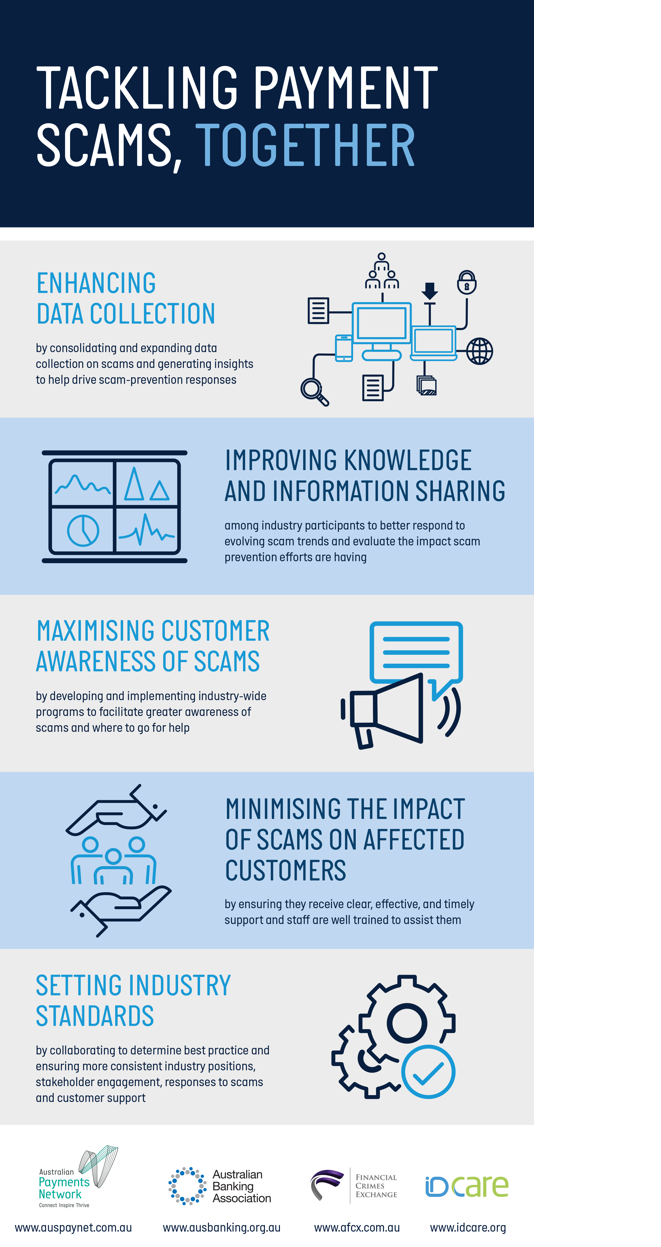MEDIA RELEASE
12 November 2021
AusPayNet reinforces industry collaboration to tackle scams, together
As Scams Awareness Week 2021 draws to a close, Australian Payments Network (AusPayNet) is reminding the community to remain alert to scams. The reminder comes as AusPayNet announces strengthened industry collaboration to safeguard Australians from payment scams and fraudulent activities.
AusPayNet, the Australian Banking Association (ABA), Australian Financial Crimes Exchange (AFCX, the financial and cybercrime intelligence exchange), and IDCARE (Australia and New Zealand’s national identity and cyber support service), are enhancing their coordination of actions to counteract payment scams targeting Australian consumers and businesses.
The coordinated approach will build on existing industry efforts by focusing on five key pillars of work:
- Enhancing data collection by consolidating and expanding data collection on scams and generating insights to help drive scam-prevention responses (led by AFCX).
- Improving knowledge and information sharing among industry participants to better respond to evolving scam trends and evaluate the impact scam prevention efforts are having (led by AusPayNet).
- Maximising customer awareness of scams by developing and implementing industry-wide programs to facilitate greater awareness of scams and where to go for help (led by ABA).
- Minimising the impact of scams on affected customers by ensuring they receive clear, effective, and timely support and staff are well trained to assist them (led by AusPayNet with specialist input from IDCARE).
- Setting industry standards by collaborating to determine best practice and ensuring more consistent industry positions, stakeholder engagement, responses to scams and customer support (led by AusPayNet).
Today, AusPayNet and its industry partners are releasing an infographic to outline the scope of their coordination.
AusPayNet CEO, Andy White, said closer coordination among the four bodies is an important step in tightening safeguards against payments scams and reducing their impact on people’s lives.
“Criminal groups are increasingly sophisticated in their targeting of individuals and businesses transacting digitally. It’s never been more important that industry bodies at the frontline of payments and transactions share their expertise and knowledge to combat scammers,” Mr White said.
“We look forward to coordinating planning and priorities with the ABA, AFCX and IDCARE to reduce the impact on vulnerable businesses and individuals.”
“We also look forward to extending this collaboration in the future across industries,” Mr White added.
Anna Bligh, CEO at the ABA, said given the significant rise of scams, the collaboration between industry stakeholders has never been more important.
“Banks used to invest heavily in steel bars and vaults because bank robbers came through the front door. Now, they’re coming through the back door and stealing our money electronically through a variety of sophisticated scams,” Ms Bligh said.
“With scams on the rise, there’s no better time to strengthen economy wide collaboration to counteract payment scams and help protect Australian customers.”
Managing Director for AFCX, David Pegley, agreed that this industry collaboration is timely and will deliver significant opportunities for coordinated action across the industry.
“Considering the complexity, scale, and impact scams are having on Australians, our collaboration couldn’t have been formalised at a better time,” Mr Pegley explained.
“AusPayNet, ABA, AFCX, and IDCARE all have a common goal of responding to the challenges of this growing criminal activity. AFCX is here to share our consolidated data insights, intelligence and expertise.”
IDCARE’s founder and managing director, Dr David Lacey, said Australia needed a “networked response to crimes we know exploit our communication networks”.
“Collaborating with communities, across industries and governments is the key to our future resilience to these crimes,” he said.
In recognition of Scams Awareness Week and the need for all Australians to understand how to protect themselves, IDCARE provides these four top tips for being alert to scams:
- Be suspicious of unsolicited texts, calls and emails.
- Do your research before responding. Scammers want you to respond without thinking but nothing is so urgent that it can’t wait for you to investigate before responding.
- If you receive suspicious contact, consult others and get a second opinion. Scammers hate bystanders; IDCARE’s research into the psychology of scams highlights the crucial difference a bystander can make.
- Stay informed about scam trends. Being aware of what scammers are doing makes a huge difference to your ability spot a scam! IDCARE produces a fortnightly free newsletter, the Cyber Sushi, which highlights trending scams submitted to its National Case Management Centre over the previous fortnight and its Facebook page posts regular scam alerts. Scamwatch also highlights new scams impacting the community on its website.
For more information about scams, and to report a scam, visit the ACCC’s Scamwatch website at www.scamwatch.gov.au.
For help and support if you have been the victim of a scam or fraud, visit IDCARE’s website at https://www.idcare.org/support-services/individual-support-services.
For online safety education and training materials, visit eSafety’s website at https://www.esafety.gov.au/about-us/what-we-do/our-programs/training.



